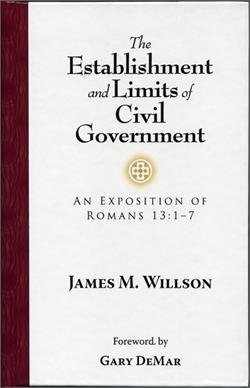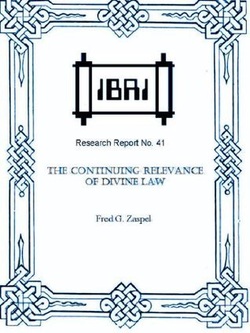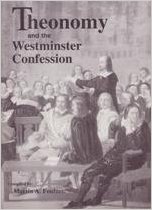Furthermore, God's Word - the standard to which all governing measures (whether self-governing, family-governing, church-governing, or state-governing) should be subject - never gives the State the right or authority to dictate what one can and cannot ingest in their bodies (provided it's not breaking some other lawful matter, like the taking away of an innocent life - for instance, the State does have a right to prohibit any type of ingestion that would induce an abortion, and execute those who would use such ingestions - Ex. 21:12, 22-25).
Therefore, yes, I think marijuana should be legal for individuals to grow and use.
All I wish to do is to call attention to the false dichotomy being imposed in the chant: "Do your job or resign." For one thing, Kim Davis, by neglecting to issue marriage licenses to homosexual couples, is doing her job. The State of Kentucky Constitution reads thus:
Book Review: The Establishment and Limits of Civil Government: An Exposition of Romans 13:1-75/27/2014
Written in the mid nineteenth century, the style was noticeably different from modern expositors. It was engaging; but you really have to be paying attention the entire time (i.e. this book is not one of those you can read with a toddler running around being all cute and cuddly and handing you things - you'll need to be in your study, alone).
When commentating on Romans 2 he advocates his position that the works of the law written on the hearts of the gentiles are simply “principles of righteousness” yet “independent of Mosaic legislation.” He does not prove this at all but simply asserts it. The apostle Paul knew how to say “principles of righteousness;” yet under the inspiration of the Holy Spirit he chose to say “works of the law.” In context of the passage and the readership of Romans I don’t know what else Paul could mean other than the Mosaic law. But apparently Zaspel has some insight into this text of which so many others throughout the history of the church are completely unaware.
To [Israel] also, as a body politic, he gave sundry judicial laws, which expired together with the state of that people; not obliging any other now, further than the general equity thereof may require. What "the general equity thereof may require," of course, is something that needs to be understood in light of the historical, grammatical context in which the statement was written.
If the authors of the Westminster Standards truly believed that the penal sanctions of the civil aspect of the Mosaic Law had no abiding validity, then understood in today's English it would seem this statement invariably settles the matter. But did they actually believe that? And if not, what is meant by that statement?
But you need to keep in mind two things (among the others covered further down): (1) It’s not a matter of your wallet, but a matter of what is right in God’s eyes (Mt. 6:24), and (2) you’re not just voting for something that affects you; you’re voting for what affects your entire community. Who doesn’t want their property value to go up? Yet as a believer, are you willing to say it’s okay to go force your neighbor to apportion some of his own earnings toward keeping your property value up? Is that really loving your neighbor?
But I don't want to get ahead of myself. First let me assure you of the things that I am not saying: Of all the wicked heresies and threatening movements facing the church in our day, when Westminster Seminary finally organized their faculty to write something in unison, they gave their determined political efforts: not to fight socialism, not to fight homosexuality, not abortion, not crime and mayhem in our society, not subjectivism in theology, not dispensationalism, not cultural relativism, not licentiousness, not defection from the New Testament, not defection from the Westminster Confession of Faith, all of which are out there, and they could give their legitimate efforts to. Boy the thing they had to write about - was Theonomy! 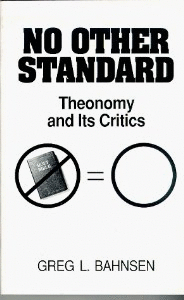 The Emperor Has No Clothes...still! In 1973, Greg Bahnsen graduated from Westminster Theological Seminary (Philadelphia, PA) with two Master’s degrees (M. Div, Th.M.). His thesis, approved by the overseeing faculty, was “The Theonomic Responsibility of the Civil Magistrate,” in which he set out to establish the theological premise that unless otherwise indicated by further revelation from God Himself, God’s law, including the civil penal sanctions, has moral abiding validity. From the encouragement of his professor John Frame, he reworked this thesis so that it could be published as a book. In 1977 it was published as Theonomy in Christian Ethics. You can see my review for that work here. In 1990 a book titled Theonomy: A Reformed Critique was published as a joint venture from the faculties at both Westminster Theological Seminaries (Philadelphia, PA and Escondido, CA) to establish a “Reformed answer” to Greg Bahnsen’s work (it took 17 years - from the date of his thesis - to formulate a “response”). In 1991, Bahnsen himself responded to their “critique” with this book, No Other Standard. If you’ve ever wondered if there were any gaping holes in the Theonomic perspective of theology, this book will settle the matter. In his normal fashion, Bahnsen applies the doctrines of Scripture with rigorous logical skill to show that God’s Word must be our standard in all matters of life - including politics and socio-political ethics. 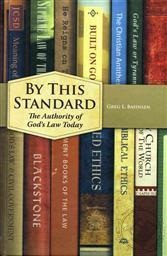 A terrific condensed book from his much larger workTheonomy in Christian Ethics. (If you're comparing page numbers it might be hard to see that since it goes from TiCE 563 pages to BTS 350 pages. But TiCE has 563 - 6"x9" pages - while BTS has 350 - 4"x6.75" pages. This makes a huge difference.) By This Standard is in many ways better than Theonomy in Christian Ethics in that it doesn't read like a master's thesis, is more digestible in its chapter lengths, is aimed at a broader audience thus more accessible for the layman, and has a great succinct section at the end refuting criticisms of his previous work on the topic. The main point of this book though is still the same: by what standard shall nations decide what is just in socio-political laws? By the standard God has revealed in Scripture. For a review of that main point, see my review of Theonomy in Christian Ethics. As for this book, Bahnsen applies the same principles of argumentation and clear exegesis but presents it in an easier tone. Of course this means his argument is not as exhaustive in this book; but it still carries the same weight. Chapter by chapter he uses Scripture over and over again to present the case. And just as before, while it is hard psychologically and emotionally sometimes to reach the conclusions he does. There doesn't seem to be any Biblical or logical reason not to come to the same conclusion. I hope every Christian interested in the Christian life, the Christian's role in social responsibility, or the nature of law, justice, and/or crime and punishment will read this book - if nothing else to at least see a view presented from Scripture that is not advocated that much today but is very hard to combat (Acts. 26:14). 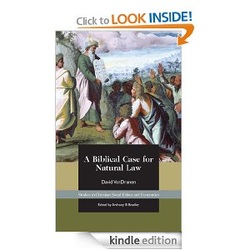 Not Even Close.... I'm not sure how Biblical this case was; and I'm not even sure it can be done, considering despite the attempt to show otherwise, if you're making a Biblical case for natural law, then you're not making a case simply for natural law but for natural law substantiated and validated by Biblical law. I realize Dr. VanDrunen used parts of the Bible to demonstrate (or at least attempt to demonstrate) his view. But even a cursory reading leads one to see it's pretty clear there's a forcing of his view from outside of Scripture into the Scripture. And while a cursory reading can find this pretty readily, it's always best to go into details when saying someone is not really presenting the Bible correctly. So here are a few examples: [Loc. 83 (Kindle Version)]: "The term [Natural Law] generally refers to the moral order inscribed in the world and especially in human nature, an order that is known to all people through their natural faculties (especially reason and/or conscience) even apart from supernatural divine revelation and that binds morally the whole human race." Here VanDrunen says there is a moral order known innately to all people, which morally binds them all. But how do we know what the specifics of those moral universals are? Well...eventually we have to discover them objectively in divine special revelation, as VanDrunen does later in his book [Loc 805]: "In conclusion, the reader might note the range of evils that are prohibited by natural law as described merely in the texts discussed in this chapter [ed. note - consider this statement: natural-law-evils prohibited as described in the Biblical-texts - irony]: murder (Gen. 4), including infanticide (Ex. 1), rape (Genesis 34); violation of the marriage relationship (Genesis 12, 20, 26); harsh treatment of servants (Job 31); slave trading (Amos 1); and judicial corruption (Ex. 18). Even were natural law limited to these, such prohibitions would afford an impressive foundation for a civilized and orderly society." 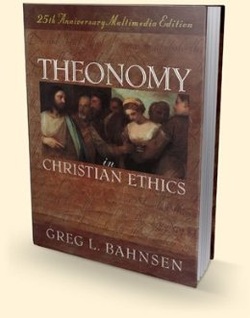 A Masterpiece of Theology, Philosophy, and Biblical Scholarship First let me say this: This book reads like a thesis (and as it started out as a thesis for a Master of Theology degree, that makes sense). But what a Biblically substantiated, exegetically sound, and theologically insightful thesis it is - by a truly gifted theologian, teacher, and communicator! It is so very rare that one comes across a book in which after finishing it he can say, "This book has truly altered the course of my life." If there is any one book - obviously apart from the Bible itself - of which this can be said by me, it is Greg Bahnsen's Theonomy in Christian Ethics. The theonomic principle as stated by Bahnsen is simply this: By "theonomy" I will mean that verbalized law of God which is imposed from outside man and revealed authoritatively in the words of Scripture" (p. 35). Theonomy is God's Law - over against man's self-law - applied in all areas of life, both in the church and in society. While throughout the history of the church it was taken on assumption that the Old Testament had abiding validity unless something in the New Testament was revealed to have cancelled or changed it in some way, in today's evangelical world just the opposite view seems to be the one most widely held: that unless a commandment is repeated in the New Testament, we should assume it no longer has abiding validity (a view with many more problems than one might think). And so Bahnsen lays out cogently, articulately, and (most importantly) Biblically in 563 pages his thesis that the Old Testament Law is just as much applicable today as it was in the days before Christ, even in the area of the civil magistrate. 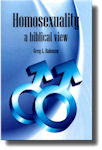 Originally published in 1978, I wondered if some of the arguments would be out-of-date. But really the arguments haven't changed that much from those who are in the homosexual community. "Oddly enough" God's word hasn't changed since 1978 either. That being the case, this book is still a valuable resource and is helpful in providing a solid understanding to the discussion of homosexuality and the Christian church. Bahnsen's work on the topic is up to his normal standard: exegetically sound, well researched, and comprehensively woven together with airtight logic. He makes his case unapologetically using God's Word as the standard, and presses the reader to undertake the same task. While homosexuality is a hot button today and the church is sometimes afraid of what to do about it, Bahnsen provides clear answers as well as cogent defenses to those who would try to persuade people otherwise. He makes clear distinctions in his vocabulary and is careful not to come across as legalistic or tyrannical; yet the reader comes away wondering how anyone could ever see the Bible endorsing or approving homosexuality, which is so often claimed today. |
Categories
All
|


